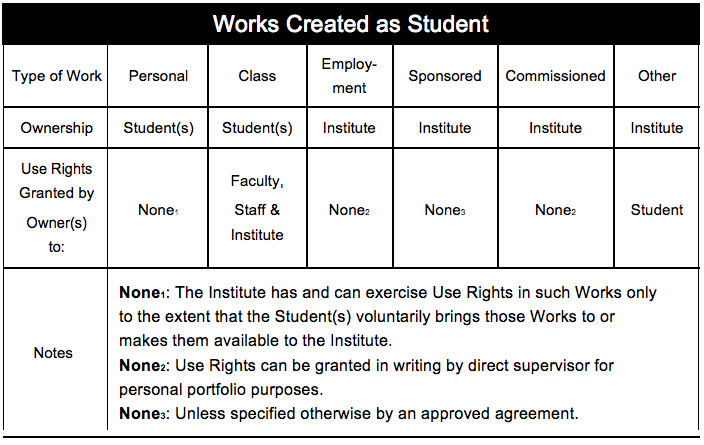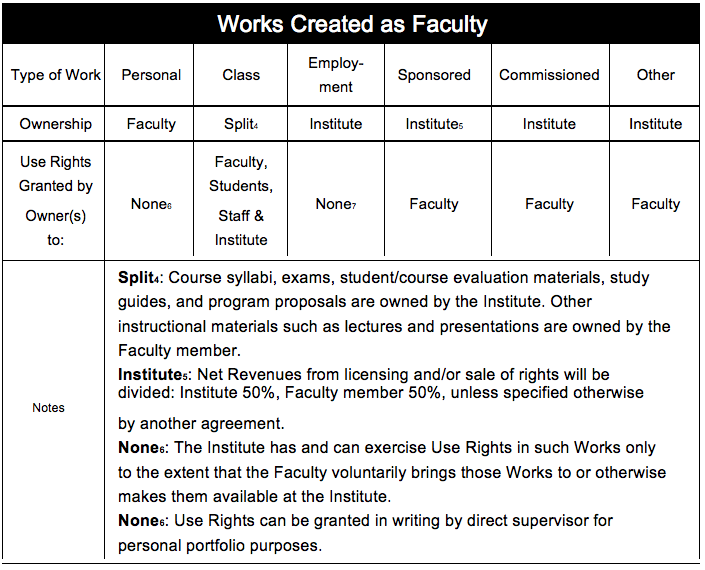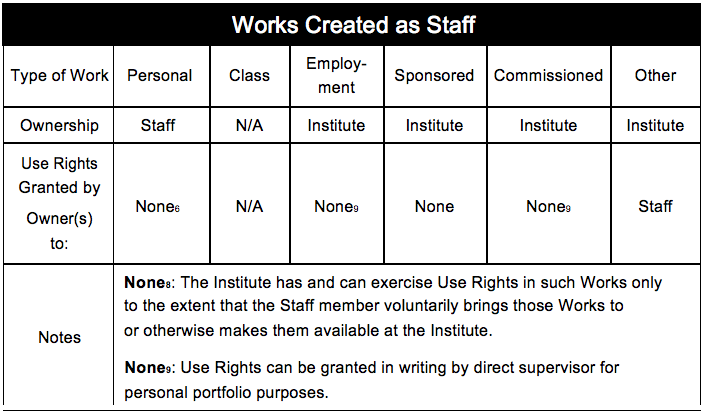Intellectual Property Policy
Policy
Policy Overview
This document sets forth Pratt Institute’s policy regarding the Ownership and Use Rights of Intellectual Property created by members of its community. This Policy establishes general rules. Its intent is to act as the default for the vast majority of our Intellectual Property issues. It should be noted that the general rules set forth in this Policy may be superseded by individual agreements addressing ownership of Intellectual Property created in the Pratt community.
The Institute is committed to fostering artistic and intellectual creativity among its Students, Faculty, and Staff. Therefore, Student, Faculty, and Staff Creators typically retain Ownership of Personal Works they create in line with time-honored academic traditions. Pratt also is committed to sharing the intellectual products of this creativity, where appropriate, to further the knowledge and academic growth of its collective community. Thus, this Policy grants certain Use Rights to various community members and the Institute to promote this sharing. Responsibilities and procedures for administration of this Policy are provided, along with processes to be followed in cases where modification of these general rules is required for specific Works. Students, Faculty Members (referred to herein as “Faculty”), and Staff Members (referred to herein as “Staff”) are required to adhere to the policies and procedures defined herein.
Definition Of Terms
The following definitions apply only to this Intellectual Property Policy.
- Committee: the Advisory Committee for Intellectual Property (ACIP).
- Institute: Pratt Institute.
- Intellectual Property: any patentable invention, copyrightable subject matter, trademarks, trade secrets, or other types of intellectual property. These include, but are not limited to, works of art, designs, architecture, literary works, writings, student theses, inventions, software, discoveries, trade secrets, musical compositions, performances, and creations that might normally be developed on a proprietary basis.
- Net Revenues: any patentable invention, copyrightable subject matter, trademarks, trade secrets, or other types of intellectual property. These include, but are not limited to, works of art, designs, architecture, literary works, writings, student theses, inventions, software, discoveries, trade secrets, musical compositions, performances, and creations that might normally be developed on a proprietary basis.
Under this Policy, Net Revenues generated from Sponsored Works created by Faculty will be divided equally between the Faculty member and the Institute. The Faculty member will have the right to request an audit with respect to these revenues, and the Institute will comply with the request in a reasonable amount of time. - Ownership: owning and controlling the Intellectual Property Use Rights to a Work or Works. The individual(s) or entity with Ownership is considered the Owner(s). It does not necessarily mean owning and controlling the physical work when the work has a physical form.
- Creator(s): any person or persons who create an item of Intellectual Property.
The following define all persons to whom this Policy applies and their classification(s) under this Policy. It is understood that individual Creator(s) can occupy more than one classification. The applicable class shall be determined by which role the individual is predominantly filling when creating a specific Work.
- Student(s): Individuals are considered Students when they are enrolled in “for credit” or “not for credit” courses or classes at the Institute whether full-time, part-time, matriculated, or nonmatriculated.
- Faculty: Individuals are considered Faculty when employed or otherwise compensated to lecture, teach, or develop materials related to “for credit” or “not for credit” courses, classes, or curriculum at the Institute.
Faculty also includes library faculty, visiting scholars/lecturers, and individuals holding faculty rank and status at the Institute while engaged in research. - Staff: All individuals employed by the Institute, full-time or part-time, are considered Staff other than when acting in the capacity of Student or Faculty. Students are considered Staff for works created as part of work-study or graduate assistantship assignments. Staff shall also include all volunteers servicing the Pratt community, except for individuals acting within their capacity as members of the Board of Trustees (BOT) and/or other than their capacity as Faculty or Staff.
- Use Rights: the non-exclusive, royalty-free, perpetual, and irrevocable license for the non-commercial purposes of education, scholarship, and exhibition. In the case of rights granted to the Institute, this also includes recruitment, accreditation, development, collection and/or archives, alumni relations, promotion, operations, and the like. It is assumed that all Use Rights remain with the Owner unless stated otherwise in this Policy or assigned. These Use Rights are not intended to limit “fair use” as defined by U.S. laws. When appropriate, attribution will be given to the Creator(s).
- Work(s): The following are intended to define all Works to which Intellectual Property Use Rights may be attached. For the purposes of this Policy, a specific Work shall belong to only one category of Work.
- Personal: traditional scholarly and artistic Works reflect-ing research and/or creativity which, within the Institute, are considered as evidence of professional advancement or accomplishment that are not considered Class or Employment. These are Works created without explicit special support or designated sponsorship by the Institute. The incidental, occasional, or even routine use of Institute facilities or equipment commonly available to the community shall not, of itself, be the basis of exclusion of Works from this category. Works produced while faculty, students, and/or staff are on sabbatical, approved leaves of absence or in conjunction with “Faculty Development Grants” are considered a part of this category, except for Course syllabi, exams, student/course evaluation materials, study guides, and program proposals. These items shall be considered as “Class” created materials.
- Class: student created academic and studio Works and Faculty created instructional and evaluation materials that are produced for classes, courses, studios, labs, or lectures planned or held by the Institute.
- Employment: all other Works created in the course and scope of employment. These Works are performed substantially using Institute facilities and equipment, but use of personal time or other facilities to create the Work does not change its basic nature if the Work is employment related. Works created in direct relation to “released time” or stipends are considered a part of this category.
- Sponsored: works created by faculty, students, and/or staff members, with financial funding or other forms of resources provided through the Institute by an external entity through a separate agreement with the Institute.
- Commissioned: specific Works created by Creator(s) at the direct request of the Institute and not in the course of the Creator(s) employment or studies at the Institute. Appropriate consideration for the creation of such Work, will be determined by agreement between the Institute and the Creator(s).
- Other: works created by other activities related to the Institute and not covered by the preceding categories, which, within the Institute, are considered evidence of service to the Institute or student body. These include Works, whether compensated or not, for the Institute, schools, departments, units, centers, labs, governance entities, clubs, committees, or events.
General Rules
The following three matrices define the general rules of Ownership and Use Rights granted for Intellectual Property created by Creator(s).
Responsibilities
A. Institute Responsibilities:
The Institute will make this Policy and any amendments widely available to the community and promote understanding and collegiality with regard to its implementation. This policy shall be published in the Institute’s Bulletins.
The Office of the Provost will provide and maintain a group of Frequently Asked Questions (FAQ’s) which clarify the Policy and assist with community understanding.
B. Creator(s) Responsibilities:
Creator(s) shall promptly disclose to the Office of the Provost the intended creation of or the development of Intellectual Property which holds possible commercial value in all categories of Work except Personal or Class Works. Creator(s) agree to execute any documents deemed necessary to perfect legal rights in the Institute and to enable the Institute to file applications for patents, copyrights, and trademarks when appropriate.
Creator(s) who are also employees of outside entities or who enter into Intellectual Property agreements with outside entities shall resolve any conflicts between this Policy and provisions of outside agreements prior to beginning any undertaking at the Institute that will involve the development of Intellectual Property. Notification of the Office of the Provost of such potential conflicts is the responsibility of the Creator.
Faculty, Staff, and/or Students may wish to enter into joint agreements between themselves in relation to the creation of Works (and commercialization thereof), specifically with regard to Personal or Class Works. The Institute takes no stake in these matters except to the extent that Use Rights are granted by this Policy. However, Creator(s) are required to disclose the existence and general nature of such agreements to the Office of the Provost in order for the Institute to safeguard against any appearance of impropriety or unfairness. The Institute recognizes that the very nature of the relationship between faculty and staff on the one hand, and students on the other is not one of equals. Faculty and/or staff engaged in joint agreements with students are expected to exercise appropriate professional and ethical behavior.
This Policy only addresses Intellectual Property. It does not address the physical property to which Intellectual Property Use Rights may be attached. It is the responsibility of the physical property’s owner to ensure the safe keeping and storage of their own physical property, whether or not other parties have Ownership or Use Rights to the attached Intellectual Property.



Procedures
The following procedures shall govern the administration of this Policy.
A. Administration of the Policy
The Office of the Provost shall be responsible for day-to-day administration and enforcement of this Policy. Management of Intellectual Property Ownership and Use Rights at the Institute, distribution of Net Revenue, and accounting of all costs, if requested, and review and approval of individual agreements that replace these general rules shall also be subject to review and approval by the Vice President of Finance and Administration. To assist with these tasks, the Office of the Provost shall establish, convene, and chair an Advisory Committee for Intellectual Property (ACIP).
ACIP Membership:
- Provost – Chair (non-voting except in cases of tie votes)
- VP for Finance and Administration – or designated representative
- VP for Development – or designated representative
- 1 Dean or Director – selected by the Dean’s Council to serve a two-year term.
- 1 Departmental Chair – selected by the Academic Senate to serve a two-year term
- 1 Faculty Member – selected by the Academic Senate to serve a two-year term
- 1 Student – appointed by the VP for Student Affairs to serve a one-year term
The Committee will establish reasonable operating procedures, to be adopted by the Senior Staff with advisement from the Academic Senate, that ensure community awareness of and compliance with this Policy and other procedures involving Intellectual Property at the Institute.
Additionally, the Committee shall serve as an advisory board and the appeals board to handle the resolution of conflicts and rulings on matters related to this Policy.
B. Agreement Approval Procedures
Review and approval of agreements outside of this Policy will be administered by the following procedure:
- The submitting party shall first submit the proposed agreement to the Office of the Provost for approval. The Provost reviews the agreement and any supporting materials, consults appropriate Institute offices and legal counsel if necessary, recommends adjustments as appropriate, and forwards the agreement to the VP for Finance and Administration for signature on behalf of the Institute, and if applicable, the submitting party(s) for signature.
- The Provost and/or the Institute reserves the right to disapprove an agreement for any reason and such determination is final. If the submitting party(s) enters into an agreement without obtaining approval, then allocation of Ownership and Use Rights provided by the relevant general rules of this Policy will remain in effect.
C. Conflict Resolution
Review of claims or disputes as to Ownership of or Use Rights to Intellectual Property at the Institute will be administered by the following procedure:
- The claim or dispute is first submitted in writing to the Office of the Provost. The Provost reviews the claim, consults appropriate Institute offices, the claimant, other members of the Pratt community, if applicable, and legal counsel, if necessary, and issues a determination.
- If the claimant is not satisfied with the determination, he or she may, at their option, forward a letter to ACIP via certified mail, detailing the claim to be resolved. The Committee will review the matter and advise the claimant of its final decision within 60 days of ACIP’s receipt of the letter.
D. Modification of General Rules with Respect to Particular Works
It is anticipated that the relevant parties may on occasion, wish to modify the allocation of Ownership, Use Rights, or other provisions provided by the general rules with respect to a specific Work(s). The burden of seeking and obtaining such an agreement will rest with the party seeking the modification. The contents of such agreements will be considered confidential by all parties, with specifics made available only to individuals required for decision-making and implementation.
Procedures for administration of such requests shall follow those outlined in section 5.B. above.
E. Amendments to the Policy
Amendments may be proposed by the Academic Senate, Student Government, Institute Administration, or ACIP. Proposed amendments, prior to submission, must be approved by a majority in each of the Academic Senate, Dean’s Council, and the Student Government. All such approved amendments shall be forwarded in writing to the Office of the Provost by the initiating group. These will be presented to the ACIP by the Provost. The Committee shall consider such amendments, and holds authority for ratification of all amendments, subject to final BOT approval.
F. Effective date of the Policy
This Policy became effective January 1, 2008, and is binding on all Creator(s). With respect to Intellectual Property created by a Creator(s) under this Policy or other agreements that represent modifications to the general Policy, this Policy and agreements shall remain binding on the Creator(s) even after their relationship with the Institute changes or terminates.
Approved by the BOT 12/04/07
Office of the Provost
718.636.3744
www.pratt.edu/about/offices/office-of-the-provost/